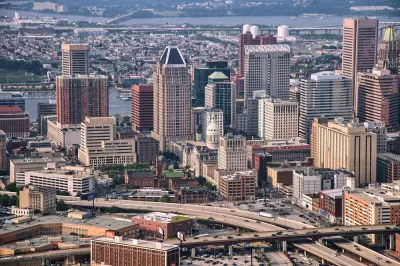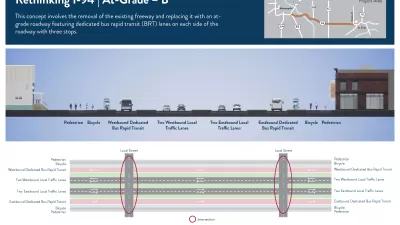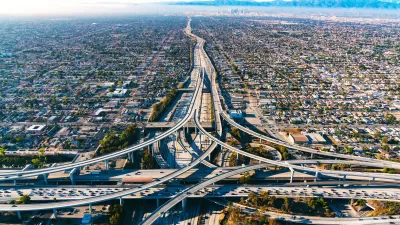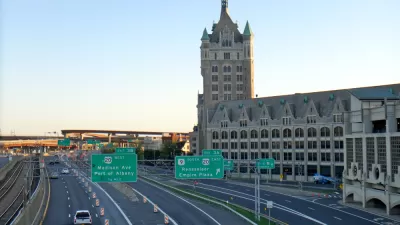Advocates of highway removal hope the Reconnecting Communities Act will help fund efforts to tear down a freeway that devastated West Baltimore neighborhoods.

Ashley Stimpson’s latest article in Next City begins with an all-too-familiar anecdote: a Black neighborhood, once woven into the surrounding city and its shops, parks, and services, is cut off by a freeway construction project, many of its residents displaced.
In this case, Baltimore’s Interstate 170 did just that to the Rosemont neighborhood in the 1970s. “More than 1,500 residents were displaced; 971 homes, 62 businesses, and one school got the wrecking ball. The area would never recover.” Today, “The sunken highway slashes through the landscape like a deep wound, separating neighborhoods and creating air and noise pollution for nearby residents.”
Now, the city says it will request grant funding through the federal Reconnecting Communities program to tear down the highway, now known as U.S. Route 40. The article describes other notable freeway removal projects, such as Rochester’s East Inner Loop and the removal of a four-lane freeway in Chattanooga.
These projects aren’t without their critics: “Some Rochester residents complained that the East Inner Loop project lacks sufficient green and retail space. Affordable housing is also a concern; new condos along the boulevard are selling for $500,000, while rent for one-bedroom apartments starts at $1,500.” Advocates insist that revitalization without displacement is possible only with the significant participation of the local community. A group called the Connecting Communities in West Baltimore Coalition is lobbying to be the voice of residents in the neighborhood as the city develops its plan for removing and replacing the road.
FULL STORY: Will The Inflation Reduction Act Finally Tear Down Baltimore’s Highway To Nowhere?

Alabama: Trump Terminates Settlements for Black Communities Harmed By Raw Sewage
Trump deemed the landmark civil rights agreement “illegal DEI and environmental justice policy.”

Study: Maui’s Plan to Convert Vacation Rentals to Long-Term Housing Could Cause Nearly $1 Billion Economic Loss
The plan would reduce visitor accommodation by 25% resulting in 1,900 jobs lost.

Planetizen Federal Action Tracker
A weekly monitor of how Trump’s orders and actions are impacting planners and planning in America.

Wind Energy on the Rise Despite Federal Policy Reversal
The Trump administration is revoking federal support for renewable energy, but demand for new projects continues unabated.

Passengers Flock to Caltrain After Electrification
The new electric trains are running faster and more reliably, leading to strong ridership growth on the Bay Area rail system.

Texas Churches Rally Behind ‘Yes in God’s Back Yard’ Legislation
Religious leaders want the state to reduce zoning regulations to streamline leasing church-owned land to housing developers.
Urban Design for Planners 1: Software Tools
This six-course series explores essential urban design concepts using open source software and equips planners with the tools they need to participate fully in the urban design process.
Planning for Universal Design
Learn the tools for implementing Universal Design in planning regulations.
Caltrans
Smith Gee Studio
Institute for Housing and Urban Development Studies (IHS)
City of Grandview
Harvard GSD Executive Education
Toledo-Lucas County Plan Commissions
Salt Lake City
NYU Wagner Graduate School of Public Service





























